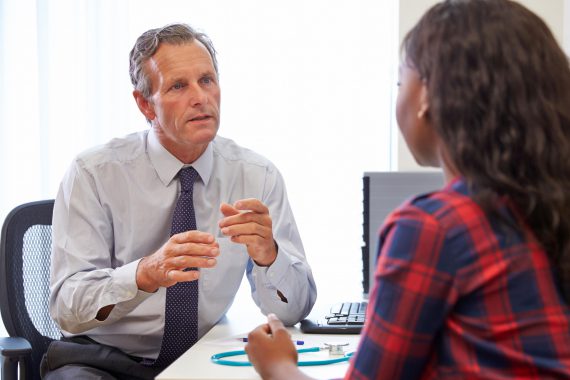Fresh off the plane from his honeymoon, the newly married 28-year-old asked nervously to see the duty doctor. A few hours later, he found himself sitting before his GP. He’d last seen a doctor when his 14-year old self sat in the very same chair with an ear infection.
Neither could comprehend how fast time had flown, as the fresh-faced junior doctor stared into his wiser counterpart’s eyes for answers. Mouth dry, he gulped anxiously, all too aware of the new lump in his neck as he did so. It suddenly seemed colossal, the elephant in the room.
Seeing things through the lens of a patient has injected us both with a new level of empathy
He knew what was coming: ‘I’ll arrange an ultrasound in a few days’ time, and we’ll get you seen in the next two weeks.’ Another patient flung back into the system, with nothing to do but endure the wait for permission to resurface. He went back home to his wife.
From that moment on, the out-of-body experience began. It was as though they’d been suddenly submerged under water. Both cut off from normality, stripped of their usual patient-facing facades brimming with youthful immortality, to expose a new vulnerability. Time seemed to crawl by excruciatingly slowly as the rest of the world scurried on oblivious.
That was my husband and I, four weeks ago.
‘We make the worst patients’. The rueful comment from the ENT surgeon ten days later brought us back down to earth. With bleary eyes and stale mouth, souvenirs of a relentless night shift in general medicine, my husband sat quietly, dazed.
Suddenly all senses were heightened; I was acutely aware of every detail, from the pounding of my heart to the firm grip of his handshake, with the Nike FuelBand dangling from his wrist. The set of notes he scribbled in, with his hospital number scrawled across the top. The glare of the familiar pathology screen behind him, my husband’s date of birth in the corner making it suddenly unrecognisable. I couldn’t help but stare at him silently with pleading eyes. Behind those anonymous identifiers, there was a person. A future.
The following week as our colleagues went on strike, fuelled by visceral contempt for Mr Hunt, we were in hospital for his hemithyroidectomy.
We know we’re lucky. We know the odds are stacked in his favour, whatever the final outcome of the histology. Nevertheless, spending a career ducking away from jargon and nudging our patients towards open dialogue hasn’t prevented us from avoiding the ‘c’ word.
But seeing things through the lens of a patient has injected us both with a new level of empathy. As the consultant presented the options, I ached for him to take control, to lift the burden of choice of our shoulders. Battling internally with a mess of raw emotion, every little thing began to matter. Every statistic was magnified. Insignificant words echoed in my ears long after the consultation. ‘As soon as possible’ could never be soon enough. I hadn’t appreciated it before.
A new level of empathy, and also a new-found gratitude, for the system, which gave us a remarkably seamless transition from primary to secondary care, delivering us from that first hunch that something wasn’t quite right, into the confident and capable hands of the person who could steer us in the right direction. Without having to worry about the costs. And for the people within it, from the receptionist at the GP surgery to the domestic staff on the ward, who listened to what mattered to us with a kindness and compassion that reminded us why we entered this profession.
We’re proud to think we’re part of this, and one of them. Wherever they take us from here.
Dr Nishma Manek is a GP trainee in London. Dr Manek is raising money for the Butterfly Thyroid Cancer Trust by running three half marathons over the next three months. If you would like to donate, please visit www.justgiving.com/3halfs3months
Pulse October survey
Take our July 2025 survey to potentially win £1.000 worth of tokens














